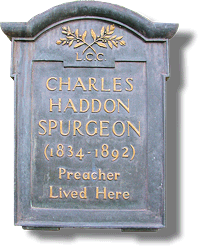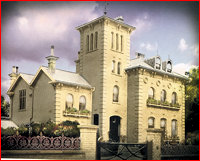by Dan PhillipsMost of our readers are old enough to remember
Ed McMahon, the genial MC for
The Tonight Show, with Johnny Carson. His job was to announce the show, and introduce Johnny Carson. Then he sat out there, played straight man to Johnny, laughed at his jokes, made Carson look good.
Through the years, Carson had various guest hosts including, I think, Seinfeld, Leno, Letterman, and Brenner. Never, as far as I know, Ed McMahon.
(Here's a funny thing: I'll bet scores of folks are already offended at this post, without even knowing for certain where I'm going with it.)
My allusion to McMahon has
one point, and one only: McMahon's job was go make
 another person
another person look good, to draw attention to him. It was to produce anticipation, and then, with his famous "Heeeeere's Johnny!", to bring on the star of the show.
If the camera had remained on McMahon, if the spotlight had been trained on him, immediately we'd have known something was very wrong. Ed wasn't the focus. Nor have I ever heard that McMahon resented his role. In fact, when he wrote a book, it was titled
Here's Johnny!, not
Hey, Look at Me! McMahon's job was defined, he embraced it, and he did it well.
So, where am I going with this? Am I suggesting that the Holy Spirit, then, like Ed McMahon?
In virtually no way. The august Person of God the Holy Spirit produced Scripture (2 Peter 1:21), was involved in Creation (Genesis 1:2), empowered Jesus' ministry (Luke 4:14), is the mode of believers' immersion into Christ (1 Corinthians 12:13), seals us until the day of redemption (Ephesians 4:30), and a great deal more. He is God.
But there is
one point of analogy, and one only: the delight and joy of the Holy Spirit is
not to train attention upon Himself.
The Holy Spirit's great love, fascination, and focus, is the Lord Jesus Christ.Before the Incarnation, the Spirit moved in the prophets. And of what did He speak through them? Among other things, He spoke of the sufferings of
Christ, and of His glories to follow (1 Peter 1:11).
The Holy Spirit performed the miracle by which the virgin, Mary, became mother to the human nature of the
Messiah (Matthew 1:18, 20; Luke 1:35). He appeared at
Jesus' baptism, not to flutter in mid-air while until everyone noticed and admired Him, but to rest on
Christ, to mark
Him out as Yahweh's anointed (Matthew 3:16;

cf. Luke 4:18).
And so the power of the Spirit continued in the ministry of Jesus, to guide Him in what He did (Matthew 4:1), and to bring glory and honor to
Jesus, marking Him as God's Son (Matthew 12:28; Acts 10:38). This He did preeminently in Jesus' resurrection from the dead (Romans 1:4).
And what would the Spirit do after Christ's resurrection and ascension? More of the same. "He will glorify me," Jesus says of the Spirit, "for he will take what is mine and declare it to you" (John 16:14). It is worth repetition:
"He will glorify me." In fact, the Greek is a bit more emphatic: "That one
, Me will He glorify." The Spirit will come to bring glory, and it is to
Jesus that He will bring this glory.
Imagine that. God though He is, personal though He is, the Spirit's aim is not to glorify Himself. It is to glorify
Jesus. And how does the Holy Spirit do that? By imparting inerrant revelation to the apostles, revelation which we have today in the Bible alone. He did this by granting them inerrant memory of
Jesus' words (John 14:26), by bearing witness to them about
Jesus (John 15:26), by convicting the world of truths related in each case to
Jesus (John 16:8-11), and by continuing to tell them the "many things" that
Jesus still had to say to them (John 16:12-13). Jesus emphasizes this last point, assuring the apostles that the Spirit would not speak
aph' heautou, from Himself, but rather from
Jesus.
When the Holy Spirit wrote a book, what was it about? At least one has to confess that the Holy Spirit's recurrent theme, strain, melody, was the person and work of Christ (Luke 24:25-27, 44-46; Acts 3:18; 10:43; 24:14; 26:22-23). If I may put it this way, you could almost re-title the New Testament
"Here's Jesus."Does it not follow, then, that the Spirit's presence and prevalence will show the impress of His personality, His grand interest?
So how do you know when the Spirit is present and prevalent in a man?
By how the man relates to Jesus. He confesses Jesus as Lord (1 Corinthians 12:13). He has the character of Jesus (Galatians 5:22-23). He moves men to confess the incarnation of Jesus (1 John 4:2). He makes the presence and person of Christ real.
A man full of the Holy Spirit will be a great lover of
Jesus, whom the Spirit loves, and of that great work of the Spirit, the Scriptures. That is, he will love
Jesus, and he will love that Spirit-breathed witness to Christ, the written Word. He will passionately care about the truths of Christ, and of the Word. That will be the proof of the Spirit's rule in his heart.
So how can we evaluate a movement whose icon is a descending
dove, who wishes thus to identify itself by a peculiar view of the
Spirit and His works? What are we forced to conclude about a movement whose great concern is insisting on a few of what they mis-identify as the Spirit's gifts, after changing the definition and description He Himself had given in the Word?
What of men or women who wish to be distinguished from all other Christians by their view of the
Spirit's work? People who do not tend to get much exercised when the person and work of
Christ, and the
Word of God, are misrepresented, attacked, slighted, smeared, rejected either outright or by implication—but who fly into action if anyone expresses skepticism about The Gifts{tm}? Who are known
not for their robust defense

of the inerrancy and sufficiency of Scripture, nor of penal, substitutionary atonement, nor of the truth of by-grace-alone, forensic justification, nor of the imputed righteousness of Christ, nor of the exclusivity of Christ's claims and Gospel, nor of the objective nature of the Word's truth—
but for the right to label an activity "prophecy" or "tongues," despite the fact that it
does not approach the Spirit-breathed, Biblical definition?
As a pastor I again and again observed folks who could never be content in a church that seeks to be Christ-centered, and to preach the Word, if it doesn't engage in certain peripheral activities. They can't "feel the Spirit" without certain worship-styles, entertainments, play-times. For them, "feeling the Spirit"—not preaching Christ—is the be-all and end-all.
M
ore to the point, what would the Spirit of God make of such a movement? Does it bear His impress, His mark? In Scripture, He is everywhere present and active, but He is always pointing to Christ, to the Father, to the work and words of God. Consider this: in contrast to the Father and the Son,
no Scripture (that I can find) presents the Spirit as prayed to nor directly addressed, nor does any verse command believers to do so. I can't say that I'm sure I know what that means—but it means
something.To make another imperfect analogy, it is as if the Spirit's delight is to grab hold of the spotlight, and then to bring all attention to the Star of the show, Jesus Christ. But if we turn to the spotlight and focus on it, and on the one who mans it, can we think that His intent is honored?
What would be the mark of a genuine movement of the Spirit? Would it not be love for Christ, and for His Word, with resultant godliness and holiness?
... and
not fascination with the Spirit?

 You see, children: I really do keep a list, and here I am checking it the second time before the big Day. It used to be a fun day, but there are so blamed many of you these days that if I don't check it at least twice and get the naughty ones off the list, I'll never make it around the 4 corners of the globe in one night.
You see, children: I really do keep a list, and here I am checking it the second time before the big Day. It used to be a fun day, but there are so blamed many of you these days that if I don't check it at least twice and get the naughty ones off the list, I'll never make it around the 4 corners of the globe in one night. So you better watch out, and no cryin' over what's coming this Christmas. Santa does not take a vote, and he's got witnesses to support his generous verdicts.
So you better watch out, and no cryin' over what's coming this Christmas. Santa does not take a vote, and he's got witnesses to support his generous verdicts.
 seriously and saw no humor in it. Plus the three commenters who would defend me. One of whom wouldn't be Phil. So... never mind!
seriously and saw no humor in it. Plus the three commenters who would defend me. One of whom wouldn't be Phil. So... never mind!

 hrist's lowliness of heart leads him to receive the most ignorant as well as the learned to himself. I know that sometimes poor ignorant people get a notion in their heads that they cannot be saved, because they cannot read and do not know much. I have sometimes, especially in country villages, received this answer, when I have been asking anything about personal religion. "Well, you know, sir, I never had any learning."
hrist's lowliness of heart leads him to receive the most ignorant as well as the learned to himself. I know that sometimes poor ignorant people get a notion in their heads that they cannot be saved, because they cannot read and do not know much. I have sometimes, especially in country villages, received this answer, when I have been asking anything about personal religion. "Well, you know, sir, I never had any learning."

 Annette at "Fish and Cans" (there's a blogname with some graphic possibilities)
Annette at "Fish and Cans" (there's a blogname with some graphic possibilities) 
 ell, Darlene and I are back from the UK, and coming home reminds me why I don't like to travel for more than 2-3 days at a time (especially in December). My desk is piled high with stuff I need to do immediately. I brought home a chest cold and a case of fatigue (or jet lag, or something)
ell, Darlene and I are back from the UK, and coming home reminds me why I don't like to travel for more than 2-3 days at a time (especially in December). My desk is piled high with stuff I need to do immediately. I brought home a chest cold and a case of fatigue (or jet lag, or something)  that is making it hard for me to think straight after 5:00 PM.
that is making it hard for me to think straight after 5:00 PM. Speaking of Dr. Masters, he kindly arranged for me to examine a priceless file full of handwritten letters from Charles Spurgeon, mostly pastoral letters written to the congregation at the Metropolitan Tabernacle.
Speaking of Dr. Masters, he kindly arranged for me to examine a priceless file full of handwritten letters from Charles Spurgeon, mostly pastoral letters written to the congregation at the Metropolitan Tabernacle.


 cf. Luke 4:18).
cf. Luke 4:18). of the inerrancy and sufficiency of Scripture, nor of penal, substitutionary atonement, nor of the truth of by-grace-alone, forensic justification, nor of the imputed righteousness of Christ, nor of the exclusivity of Christ's claims and Gospel, nor of the objective nature of the Word's truth—
of the inerrancy and sufficiency of Scripture, nor of penal, substitutionary atonement, nor of the truth of by-grace-alone, forensic justification, nor of the imputed righteousness of Christ, nor of the exclusivity of Christ's claims and Gospel, nor of the objective nature of the Word's truth— Anyway, I had this 6-part series at my blog about Christmas which you'll have to read for yourself if you're interested because this is a blog for original stuff -- not recycled trash. Recycled Spurgeon, maybe -- but not trash. My point is that I took 6 parts to finish that series and I didn't get to say something. I couldn't figure out how to work it in, so I brought it over here. And it works in nicely with Dan's post from yesterday, so it's all gravy -- it's like we planned it.
Anyway, I had this 6-part series at my blog about Christmas which you'll have to read for yourself if you're interested because this is a blog for original stuff -- not recycled trash. Recycled Spurgeon, maybe -- but not trash. My point is that I took 6 parts to finish that series and I didn't get to say something. I couldn't figure out how to work it in, so I brought it over here. And it works in nicely with Dan's post from yesterday, so it's all gravy -- it's like we planned it. Listen: in this way -- this Christmas way -- God so loved the world that he gave His only begotten son. Gave His son! God did something about love at Christmas which people could see and hear and touch with their own hands. And we are called by His name to be a people like that given Son.
Listen: in this way -- this Christmas way -- God so loved the world that he gave His only begotten son. Gave His son! God did something about love at Christmas which people could see and hear and touch with their own hands. And we are called by His name to be a people like that given Son.

 dress rehearsal, and
dress rehearsal, and 

 taskmaster? Nowhere! But that little one there — what is that he's carrying? Why, it's a bit of food, isn't it. And the one behind him, he's carrying some too. And that knot of little fellows there, struggling along together... why, they've got a nice, plump grasshopper, haven't they? That should serve them well in the coming winter.
taskmaster? Nowhere! But that little one there — what is that he's carrying? Why, it's a bit of food, isn't it. And the one behind him, he's carrying some too. And that knot of little fellows there, struggling along together... why, they've got a nice, plump grasshopper, haven't they? That should serve them well in the coming winter.

 n Tuesday, Darlene and I went with Tom and Kathy McConnell and sons to Bedford to visit the Bunyan Meeting Free Church, whose name (of course) comes from their best-known pastor,
n Tuesday, Darlene and I went with Tom and Kathy McConnell and sons to Bedford to visit the Bunyan Meeting Free Church, whose name (of course) comes from their best-known pastor,  In keeping with this week's theme, Bunyan was another uneducated preacher who had a few things in common with
In keeping with this week's theme, Bunyan was another uneducated preacher who had a few things in common with  It's ironic that this uneducated workman became one of the best-known preachers of the Puritan age (an era rich with well-schooled pastors, theologians, and doctors of divinity). Perhaps it is even more ironic that such a man made so important a contribution to English literature—writing one of the greatest allegories of all time, Pilgrim's Progress.
It's ironic that this uneducated workman became one of the best-known preachers of the Puritan age (an era rich with well-schooled pastors, theologians, and doctors of divinity). Perhaps it is even more ironic that such a man made so important a contribution to English literature—writing one of the greatest allegories of all time, Pilgrim's Progress.




 iggybacking on
iggybacking on  On Dec. 28, 1384, Wycliffe had a stroke while leading a service here and was carried out on his chair through the diminutive door in the photo at the left. He died three days later.
On Dec. 28, 1384, Wycliffe had a stroke while leading a service here and was carried out on his chair through the diminutive door in the photo at the left. He died three days later. Wycliffe, of course, is known as
Wycliffe, of course, is known as 
 et me tell you that it is one of the blessed effects of the Holy Spirit to make ministers preach simply. You do not want the Holy Spirit to make them ride the high horse and mount up on the wings of the spread-eagle to the stars; what is wanted is to keep them down, dealing with solemn subjects in an intelligible manner.
et me tell you that it is one of the blessed effects of the Holy Spirit to make ministers preach simply. You do not want the Holy Spirit to make them ride the high horse and mount up on the wings of the spread-eagle to the stars; what is wanted is to keep them down, dealing with solemn subjects in an intelligible manner. It's a no-frills BlogSpotting today as I don't have Phil's patience to format the word "BlogSpotting" every time it comes up. And, of course, I'm not quite as nice.
It's a no-frills BlogSpotting today as I don't have Phil's patience to format the word "BlogSpotting" every time it comes up. And, of course, I'm not quite as nice.








